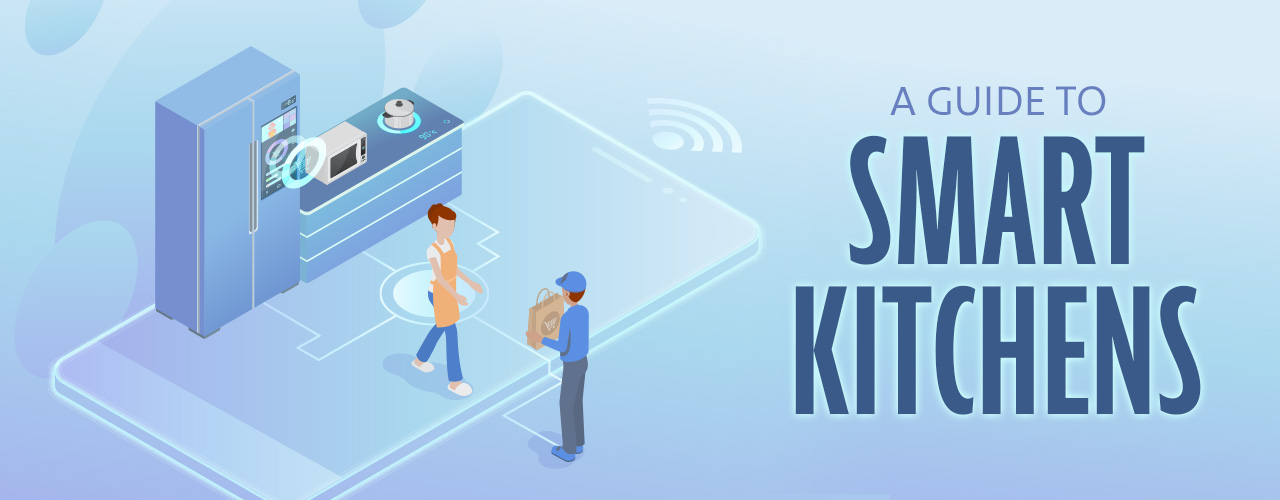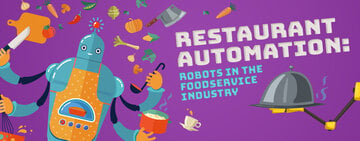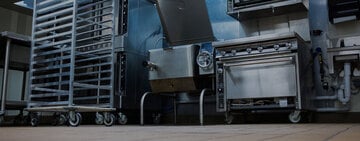Smart Kitchens and Connected Restaurants
Last updated on Feb 11, 2026Kevin SinghelIn restaurants, the quality of kitchen equipment correlates with the quality of products and service. Modernizing your kitchen has the potential to improve many aspects of your business, including faster preparation times, appliance energy-efficiency, and better-prepared food. Smart kitchens offer a variety of features that older kitchens cannot, making it wise to become a more connected restaurant. With so much potential around the growing trend of smart kitchens, we’ve created a guide detailing what smart kitchens are like and how they can better your establishment.
Shop All Smart Kitchen AppliancesWhat Is a Smart Kitchen?
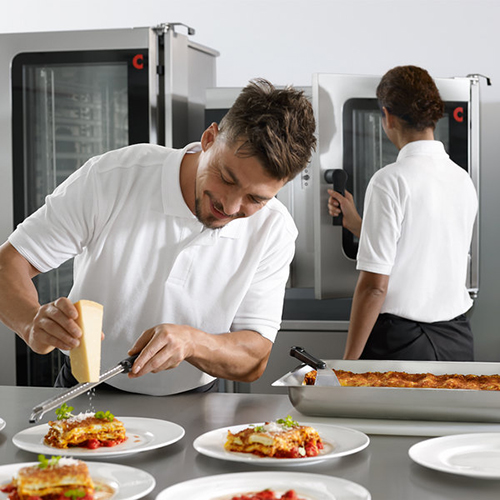
A smart kitchen is defined as an area composed of kitchen equipment that is connected via Wi-Fi or Bluetooth. The equipment found in smart kitchens connects to other tech such as your phone or tablet, allowing you to control appliances remotely. The extra control and data smart kitchens provide aids in efficiency, precision, and safety. Other benefits of utilizing a smart kitchen include increased output, reduced number of accidents, and lowered overhead costs.
Smart Kitchen Equipment
Smart kitchen equipment comes in many different sizes and spans several types of appliances. A piece of smart kitchen equipment may be voice-activated or remote-controlled from a phone, while another smart kitchen appliance may keep internal temperature logs or perform self-maintenance. The key defining feature of smart kitchen equipment is customizability, allowing you to set up and program your equipment as you see fit. If you’re trying to establish your smart kitchen, try integrating the following appliances into your connected restaurant:
1. Smart Combi Ovens
A combi oven combines three methods of cooking into one appliance, making them a vital part of a commercial kitchen. Upgrading your equipment to a smart combi oven can increase efficiency and opens up a slew of new features. Smart combi ovens can be turned on and off from a remote device, even when you’re off-site. Because of this, you can even start your smart oven before arriving at your restaurant, meaning it's immediately ready for use.
2. Smart Grills
Wi-Fi-enabled grills streamline your kitchen’s grilling process, making it easier to monitor. Smart grills have programmable meat probes that communicate with the digital control board, allowing you to see your food’s exact temperature from another device. You can sync your smartphone or another device to your grill, allowing you to change the grill’s temperature remotely. Additionally, smart grills feature automatic start-up and cool-down sequences, saving energy and allowing for easy clean-up.
3. Smart Coffee Makers

Smart coffee makers are extremely versatile, allowing owners to stay on top of new coffee trends and opening up many new options for operators. Wi-Fi connectivity allows smart coffee makers to connect to mobile devices, alerting staff when coffee is ready or when a pot is empty. Some smart coffee makers automatically reduce tank temperatures during idle periods, saving energy and lowering utility costs. Lastly, many Wi-Fi-capable coffee machines feature an integrated brew counter, allowing you to prepare for preventative maintenance and accurately order coffee supplies.
4. Smart Refrigeration
Refrigeration is another great area of equipment to add connectivity to, as smart refrigerators add a slew of helpful features to your establishment. First, regular maintenance checks and real-time feedback allow your establishment to avoid disaster and keep refrigerated contents safe from equipment error. Rather than have food spoil or deal with inflated maintenance costs, built-in monitoring can alert operators to problems immediately. Smart refrigerators will also tell you exactly when parts need to be replaced, preventing you from replacing parts too early or too late.
5. Smart Dishwashers
The connectivity of smart dishwashers ensures that you are getting the most out of your equipment. Error code reporting and machine status allow you to monitor the health of your equipment, ensuring your commercial dishwasher always performs at maximum efficiency. Additionally, other features such as temperature logs and usage analysis give you a clear picture of dishwasher use in your establishment, allowing you to plan and prepare for how your dishes are cleaned.
What Is IoT?
The Internet of Things (IoT) is a network of physical objects that are all connected in some way. These objects have sensors and software that are designed to monitor and transmit data to other devices. IoT allows for entire networks to work together, transferring data between one another and allowing for remote access. IoT can provide businesses with the tools needed to automate tasks, while simultaneously providing extensive data and information businesses can use to improve their services.
IoT in Food Industry
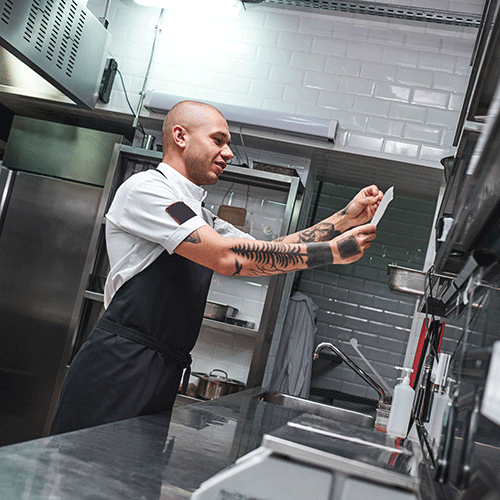
The IoT movement is being integrated into a variety of different areas of life and is becoming a major trend in the food service industry. IoT in the food industry has a long list of positive benefits for restaurants and the movement has the potential to change the industry forever. Upgrading to a smart kitchen makes it easier for restaurants to complete their main goal of providing customers with high-quality food and service. As technology advances and more smart kitchen equipment is developed, the IoT movement will have an even bigger impact on the food industry.
Benefits of IoT
There are many benefits to creating a smart kitchen that is connected via IoT, helping your restaurant become a more well-rounded establishment. Some operators may be wary of the cost or effort that must go into establishing a connected kitchen, but most of the time the positives far outweigh the negatives. If you’re establishing a smart kitchen in your restaurant, here are some of the benefits you can expect to enjoy:
1. Safety
Sensors in smart kitchen equipment monitor performance, helping you to ensure that nothing is wrong with your appliances. Equipment will automatically alert operators when performance issues occur or when equipment malfunctions, guaranteeing that no accidents involving the preparation of food occur. Additionally, the connectivity of smart equipment allows appliances to be shut down remotely, meaning in the rare case of a malfunction processes can be immediately canceled.
2. Efficiency
Smart kitchen equipment monitors its energy usage and temperature and operates at optimal levels, helping to reduce maintenance and overhead costs. Some equipment self-diagnoses problems and automatically orders maintenance parts, speeding up the repair process.
3. Ease of Operation
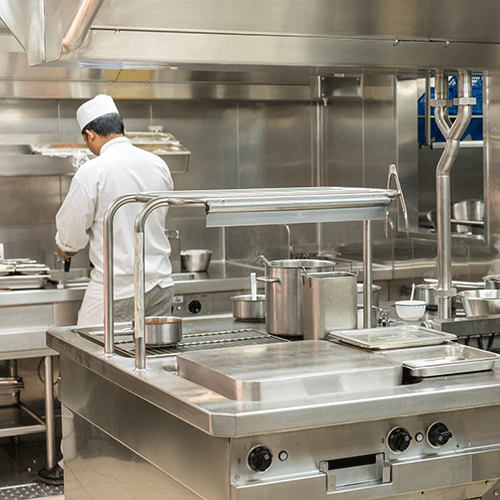
Despite being more technologically advanced, most smart kitchen equipment is easier to operate than its older counterparts. Equipment such as ovens can be precoded with recipes and temperature settings, allowing them to be operated with the touch of a button. If you plan on hiring young workers or are dealing with staffing shortages, smart kitchen equipment can help reduce the training time required for newer employees.
4. Recordkeeping
Smart kitchen equipment like ovens and refrigerators connect to the cloud and provide live data such as current temperature. These records and data allow you to monitor the food being cooked at all times. Additionally, the stored data helps keep track of what's being ordered and what’s being made, helping operators make more informed business decisions.
5. Sustainability
Smart kitchen appliances have sensors that identify individual food products and the temperatures they need to be prepared. When needed, these pieces of equipment are able to reduce output automatically, lowering your establishment's energy usage. Outside of energy usage, smart kitchen equipment also allows you to monitor and cut down on the use of other important resources such as water.
How to Optimize Wi-Fi Speed
If you’re planning on utilizing a smart kitchen, you need to optimize your establishment’s Wi-Fi speeds to take full advantage of your smart kitchen equipment. Wi-Fi and connectivity issues can cause your smart kitchen appliances to malfunction, lowering efficiency in your kitchen. Taking a few steps to boost connectivity in your business helps ensure all your devices run smoothly and can communicate with each other. To optimize Wi-Fi speed in your business, try the following methods:
- Upgrade Router - Upgrading your wireless router to a new model helps improve connectivity. Some features of new routers include better Wi-Fi range and a stronger signal.
- Alter Router Placement - The router's location is important because routers have limited range and capacity. Placing your router nearby your connected devices and eliminating potential signal barriers significantly improves internet speeds.
- Boost Router Antenna - Rather than upgrading your entire router, use an external antenna to boost your signal. External antennas boost your router’s signal, increasing Wi-Fi range and connectivity with devices.
- Integrate Extenders/Repeaters - For large establishments, integrating Wi-Fi extenders into your network is the best way to expand your Wi-Fi range. Wi-Fi extenders boost the signal from your router, allowing you to extend its range to all corners of your establishment.
- Update Firmware - Much like your devices, routers have software they run. Keeping your router’s firmware up-to-date is a great way to ensure you're maximizing your network’s speed and security.
- Utilize Powerline Adapters - Powerline adapters serve as a tool to limit the load on your network’s bandwidth. Wiring devices that struggle with connectivity to your router allows you to boost that device’s speed while simultaneously limiting stress on bandwidth.
Upgrading your restaurant’s kitchen to improve connectivity is a fantastic way to improve your kitchen’s efficiency and quality. IoT is rapidly becoming one of the most important tech trends, both inside and outside of the foodservice industry. Adopting an IoT kitchen model early will improve your service, and as an early adopter of this growing trend, you will reap the benefits for years to come.
